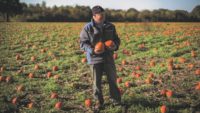olam food ingredients (ofi) has developed its first public sustainability targets for its 50,000 acres of almond orchards and farming operations in Australia and the U.S.
By 2030, ofi is committing to a broad range of almond-related targets[1], including:
- Increasing its irrigation distribution uniformity to 90%+ on all orchards[2]
- Reducing absolute scope 1 and 2 GHG emissions in line with achieving a 1.5˚C pathway
- Offsetting 75% of total energy demand by purchasing renewable energy
- Achieving Bee Friendly certification across 100% of almond orchards
- Achieving annual cover cropping in 75% of all orchards.
“At every stage, from plant to palate, we aim to delight consumers while supporting our purpose to be the change for good food and a healthy future," said Ashok Krishen, CEO of ofi’s nuts platform. "As one of the world's largest almond growers, we’ve long invested in sustainable practices across some of our almond farming operations, like state-of-the-art irrigation and bee-friendly habitats. Now, we are seeking to deliver even more transparency and impact by setting public targets and sharing our data and insights."
“Customers can use ofi’s almonds, processed in our manufacturing facilities across the U.S., Australia, and Vietnam, with our other sustainably-sourced ingredients to create customized products. From chocolate-coated almonds made with ofi sourced cocoa, to almond milk lattes made with organic coffee and spices, we can work with customers to create natural, delicious, and sustainable products with our ingredients.”
Almond Trail sets out ambitious targets for water stewardship, carbon reduction, and support for communities and ecosystems, including a commitment to reduce greenhouse gas (GHG) emissions in line with achieving a 1.5˚C pathway.
“Innovation will be key to achieving these goals by using smart tech to track everything from tree growth to soil health," said Burcu Turkay, global sustainability manager, ofi’s nuts platform. "We’re working with several university partners to explore new research opportunities. For example, we’re looking at the potential of artificial intelligence in making data-driven decisions to optimize fertilization and water use."
“We’re also using technology to measure our impact. We will track sustainability data through our insights platform, AtSource [3], helping us to monitor our progress and provide customers with a single view of their supply chain sustainability. For instance, in 2020 we launched the 'More Crop per Drop' trial, to better understand the behavior of almond trees under different conditions. Using innovative technologies to track everything from tree growth to soil health helps us to understand and reduce our water footprint.”
[1] These targets apply to ofi orchard volumes
[2] *Baseline is 80% irrigation distribution uniformity.
[3] AtSource is ofi’s sustainability insights platform, powered by a comprehensive suite of data and metrics to report on the social and environmental impact of almonds, as well as other ingredients, across the entire value chain. There are three tiers of data with increasing granularity for customers’ to choose from, based on their sustainability management requirements.
.png?1657120291)

.png?height=200&t=1670345955&width=200)

